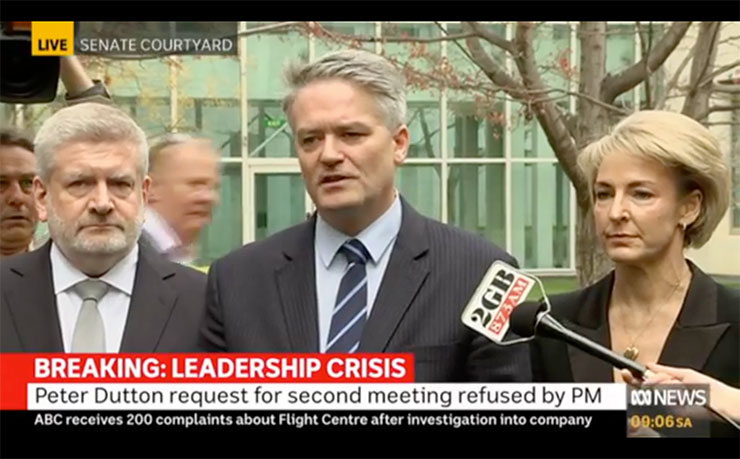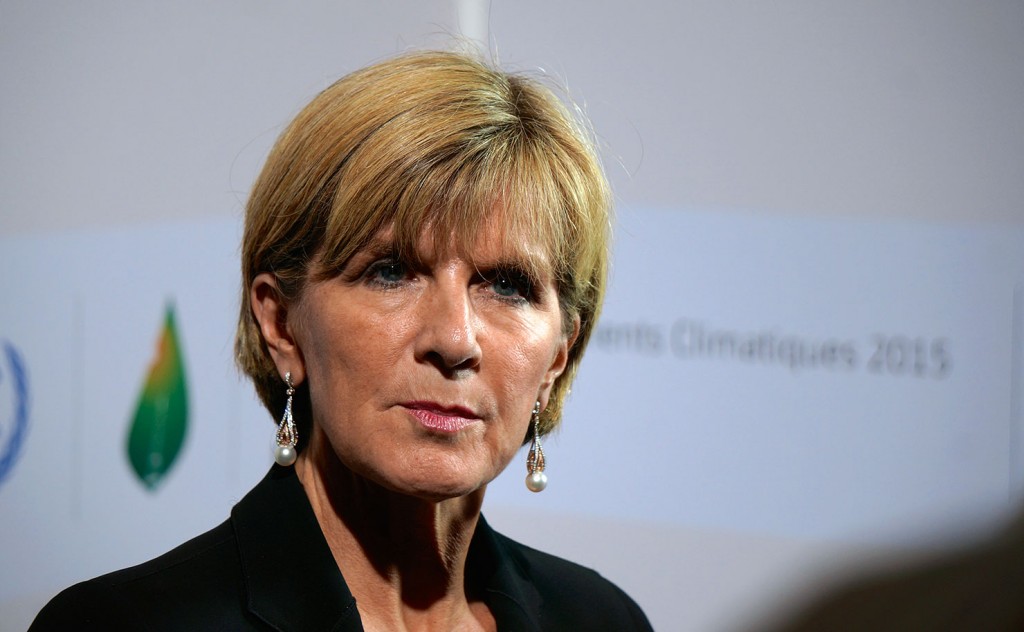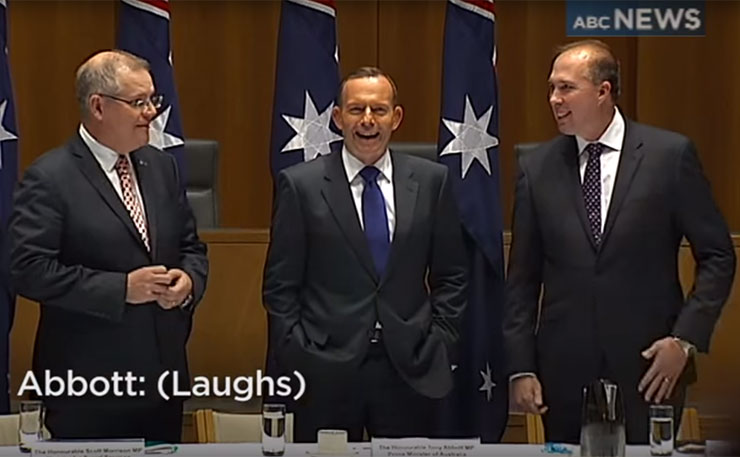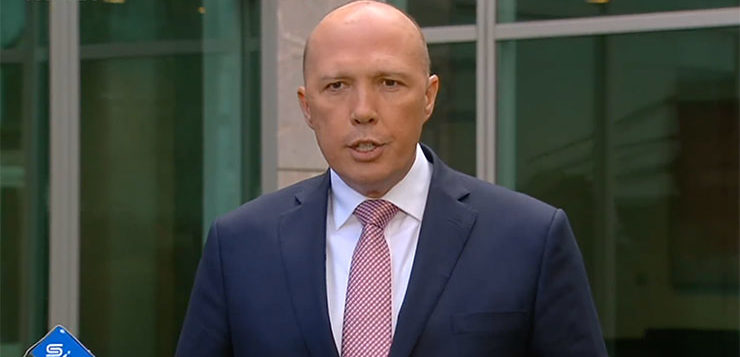With the Australian Government plunge into unbridled chaos, Chris Graham looks to the past to explain a very bleak political future.
Australia has never been particularly good at learning the lessons of its past. Just ask any First Nations person.
But as ‘those’ history wars rage on, our political class has created a whole new history to talk about, simply by declaring war on itself. And on basic, common sense.
Earlier this morning – just five minutes after the rising of parliament – Finance Minister Senator Mathias Cormann held a press conference to announce that, overnight, he had informed Malcolm Turnbull he no longer had the support of the majority of the members of his Liberal Party parliamentary colleagues.
Described by every mainstream media outlet as Turnbull’s “Praetorian Guard” – because the only thing more appealing than groupthink is sounding learned and dramatic – Cormann went from loyal colleague to not-quite-Brutus, but at the very least, the bearer of bad news.
What’s strange about the story is that it last the night without being ‘officially’ leaked. Media were certainly speculating about kingmaker Cormann’s next move – he held the keys to The Lodge, in affect, after Turnbull narrowly survived a leadership ballot on Monday – but no-one knew for sure where he sat.
Now we do, although many of us wish we didn’t.
Beyond there being a Liberal party room ballot, what happens next is anyone’s guess. The most likely outcome is that Peter Craig Dutton – the 47-year-old former Queensland copper who made a political name for himself inflicting cruelty for cruelties’ sake on asylum seekers – will be Australia’s 30th Prime Minister. He’ll also be our seventh in just over a decade.

To give you some sense of just how spectacularly unstable that is, you have to go all the way back to John McEwen – in office two years before Neil Armstrong walked on the moon – to name the seven preceding PMs.
At this stage, the only other apparent alternative leader is the pioneer of modern-day asylum seeker bashing, Scott Morrison, who may stand against Dutton as a ‘compromise candidate’. We’ll likely know the outcome in a few hours.
Whatever happens, at least one MP (Kevin Hogan from the Nationals) has threatened to move to the crossbench if Turnbull is removed. It’s one of those things minor political figures say in the heat of battle, when they were confronted with national media attention for the first time in their life.
Hogan may or may not follow through on the threat – who knows – but if he does, it means the government, ruling with a one-seat majority, cannot simply bank on a neat albeit ugly leadership transition. Similarly, the Liberals can’t necessarily expect Turnbull won’t resign from parliament altogether, thus forcing a by-election in the seat of Wentworth, or possibly even triggering an early election.
Contrary to popular belief, if an election is called, it doesn’t have to be held by May 18 next year. At least not a full election. The government could conceivably call two elections – one by May 18 to elect a half Senate, and another by November 2 to elect the House of Representatives along with the four Senators from the Territories (ACT and the NT). That sort of lunacy would, obviously, aggravate voters, but it’s hard to imagine voters being any more aggravated than they already are. Still, stranger and ‘stupider’ things have happened.
Speaking of stupid, whenever an election is called, the Liberals will likely lose it, no matter who they run. They could try and ‘save some of the deck chairs’ by falling behind someone like Julie Bishop, or to a lesser extent Morrison. Bishop might even give them a fighting chance of actually being competitive, such is the depth of unpopularity of the Opposition Leader Bill Shorten, a man whose naked ambition is matched only by that of Peter Dutton (or, obviously, Tony Abbott).

But the ‘Bishop’s gambit’ would be predicated on the notion that the Liberals are approaching this whole fiasco logically, something which is obviously not a feature of the modern party of conservatives. If it was, there never would have been a challenge in the first place.
Only a few weeks ago, polling showed Turnbull had steered his party to a respectable position – 49 percent to Labor’s 51. Turnbull has also consistently been the preferred Prime Minister over Shorten, which highlights one of the really spectacular ironies the Liberals now confront.
Internally, party hacks like Abbott and Dutton genuinely seem to believe (or at least promote) that the Liberals have ‘alienated their base’ by elevating a ‘moderate’ like Turnbull. They point to results in the recent Longman by-election, where One Nation won almost 16 per cent of the primary vote, and a comfortable victory was claimed by Labor.
It’s a memory of convenience at work, because One Nation preferenced against Labor at that by-election, putting them second last on their ballot behind the Liberals and the ultra-racist Australia First party. Similarly, at the 2016 election, an analysis by ABC’s Antony Green shows that while One Nation preferences were important, they weren’t decisive to installing Labor’s Susan Lamb.
In truth, the move by Dutton is more about ambition and payback on Turnbull than shoring up the conservative base, with polling consistently showing that the punters don’t hate Turnbull – they just hate the instability of the Liberal Party… i.e. they don’t like Tony Abbott, or his brand of wrecking politics.
Had Abbott had left politics gracefully, it’s entirely possible Turnbull could have enjoyed a Howard-esque like domination of Australian politics, such was his broad appeal when he first took the reigns.
Instead, Abbott stuck around and sniped, and wrecked, and plotted and schemed. And Peter Dutton is now poised to exact Abbott’s revenge, and pave the former PM’s way for a return to the front bench.

If both those things eventuate, the Liberals will have added insult to hapless, inexplicable injury. Abbott’s unlikeable presence will loom larger than life and logic in any cabinet silly enough to include him. He will be the distraction that turns safe Liberal seats into marginal ones.
Having said that, a warning for those who simply can’t conceive a Dutton-led Australian Government: If you’re trying to judge Dutton’s ability to win over a tired Australian public from the perspective of a left winger, don’t bother. Dutton may be a red rag to a bull for progressives, but it was just as inconceivable that Tony Abbott could ever become Opposition leader, let alone Prime Minister. And yet he did.
Dutton can as well, indeed he possibly will be by tonight, and he’s unlikely to be as blind to ordinary Australian sentiment as Abbott was (see ‘Knights and Dames and ‘The Onion’).
Dutton may be bland and unlikeable, and while his nickname ‘the Potato’ is a comment as much on his appearance as his personality, he’d hardly be the first Australian Prime Minister to lack the ‘everyman pizazz’.
Remember John Howard, and the left’s apoplexy at his elevation?
And don’t forget that just as Labor’s greatest strength is Peter Dutton (or possibly Tony Abbott, or Eric Abetz, or Kevin Andrews or take your pick), the Liberals’ greatest strength is Bill Shorten. Both men are deeply unpopular with the public, Shorten even more so because he’s better known. Which is another beautiful irony – both major parties are now firmly entrenched in the habit of choosing leaders who, the more they become known, the less they are liked, over candidates with broad electoral appeal (like Albanese for Labor, or Turnbull for the Libs).
The upside of a Dutton elevation is that it may well do so much harm to the Liberal Party that the good old white boys don’t see a return to government for a generation. But of course, that would necessitate Labor installing a leader other than Shorten, a man whose sycophantic charm is matched only by his robotic, pre-packaged ‘spur of the moment’ zingers.
The upshot is the Australian people will be asked later this year, or sometime in 2019, to choose between two leaders whose deep unpopularity is matched only by the depth of the electorate’s cynicism.
Feels like we’ve been here before. The cycle continues. History repeats.
But despite what you might think, Australian politics hasn’t hit a new low. We’ve been here for a while. It’s just bottomed out.
This is where we reside now, indeed it’s where we’ve resided for a decade, and the bad news is there’s no conceivable way out of it anytime soon.
Donate To New Matilda
New Matilda is a small, independent media outlet. We survive through reader contributions, and never losing a lawsuit. If you got something from this article, giving something back helps us to continue speaking truth to power. Every little bit counts.




